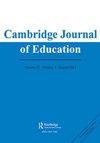英国的民主公民身份、批判性识字和教育政策:一个概念悖论?
IF 1.5
3区 教育学
Q2 EDUCATION & EDUCATIONAL RESEARCH
引用次数: 4
摘要
摘要本文指出了英国最近的教育政策与社会民主对批判性识字的理解之间的概念悖论。最近的政治事件,包括英国脱欧、2020年美国总统大选和冠状病毒大流行,都重申了教育的必要性,使学生能够批评网上流传的信息。在阐述批判性识字谱系作为一种民主教育模式之后,作者将这些理论方法置于英国中等教育改革的背景下。然后,本文借鉴教师代理研究,考虑实施能够驾驭当前政治形势的批判性识字教育法的实际障碍。为了解决文学教育和数字媒体研究中的差距,总体观点是,自2010年以来,英国的教育政策一直为新自由主义国家体系的优先事项服务。在这种背景下,培养21世纪沟通挑战所要求的民主、社会正义导向的批判性素养既令人生畏,又迫在眉睫。本文章由计算机程序翻译,如有差异,请以英文原文为准。
Democratic citizenship, critical literacy and educational policy in England: a conceptual paradox?
ABSTRACT This article identifies a conceptual paradox between recent educational policy in England and a social-democratic understanding of critical literacy. Recent political events including Brexit, the 2020 U.S. Presidential Election, and the Coronavirus Pandemic reiterate the need for pedagogies that equip students to critique information circulated online. After setting out critical literacy’s genealogy as a democratic educational model, the authors situate these theoretical approaches within the context of English secondary education reform. The article then draws on teacher agency research to consider the practical barriers to implementing a critical literacy pedagogy capable of navigating the present political landscape. Addressing gaps within literary education and digital media research, the overall argument is that educational policy in England since 2010 has served the priorities of a neoliberal state system. In this context, enacting the democratic, social-justice orientated critical literacy demanded by the challenges of communicating in the twenty-first-century is both daunting and urgent.
求助全文
通过发布文献求助,成功后即可免费获取论文全文。
去求助
来源期刊

Cambridge Journal of Education
EDUCATION & EDUCATIONAL RESEARCH-
CiteScore
5.30
自引率
4.30%
发文量
35
期刊介绍:
Cambridge Journal of Education publishes original refereed articles on all aspects of education, with a particular emphasis on work that contributes to a shared understanding amongst academic researchers, theorists, practising teachers, policy-makers and educational administrators. The journal also welcomes the submission of systematic review articles that summarise and offer new insights into specific areas of educational concern. With a wide international readership, Cambridge Journal of Education publishes contributions drawn from different educational systems and cultures enabling continued in-depth discussion of global educational theory, policy and practice. The journal’s Special Issue programme encourages and stimulates focused discussion and engagement with significant themes and responses to topics raised by readers and contributors. Cambridge Journal of Education welcomes proposals for future editions.
 求助内容:
求助内容: 应助结果提醒方式:
应助结果提醒方式:


